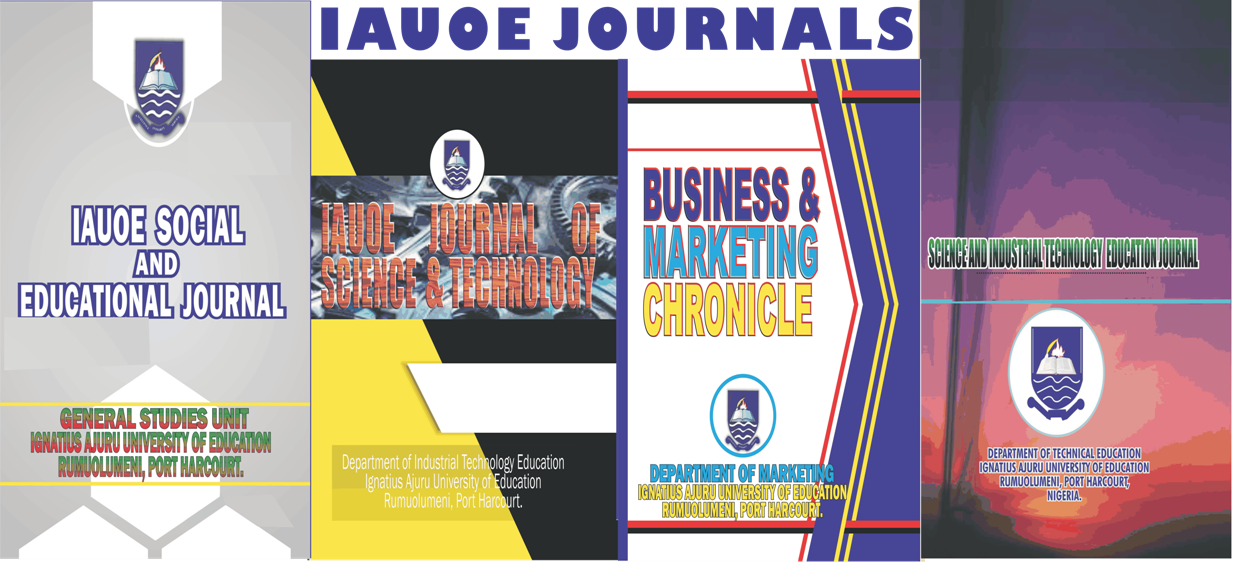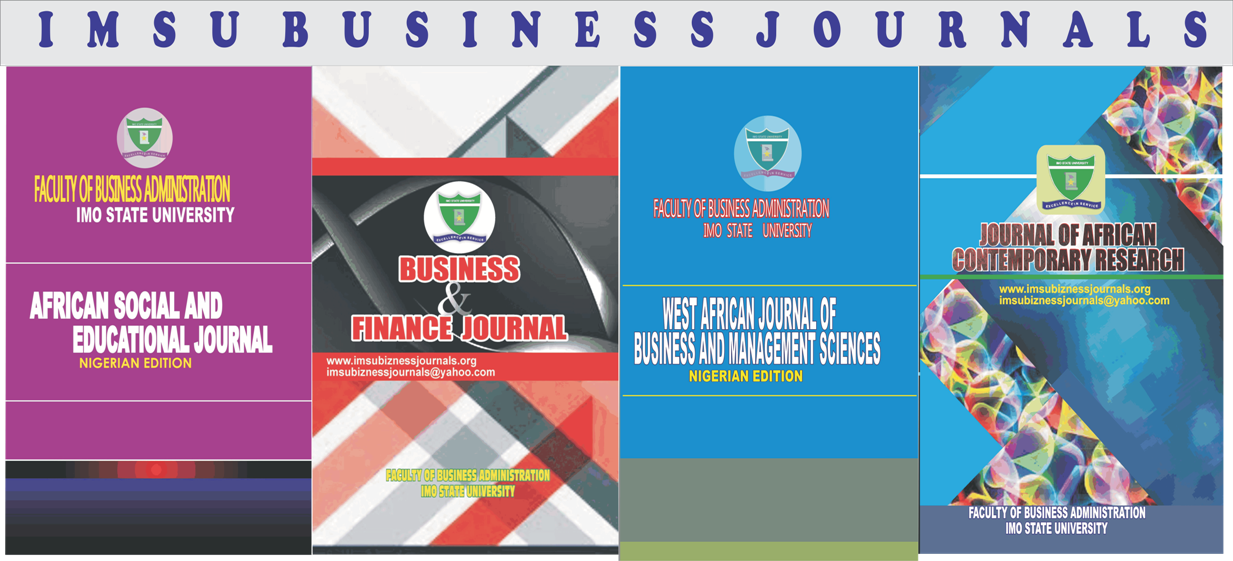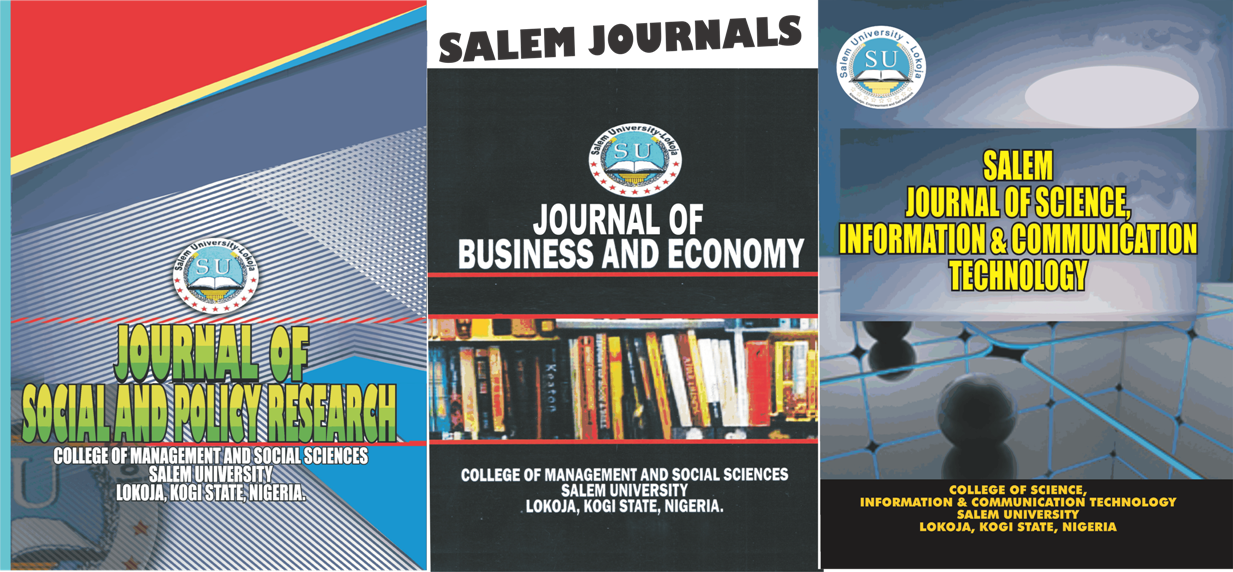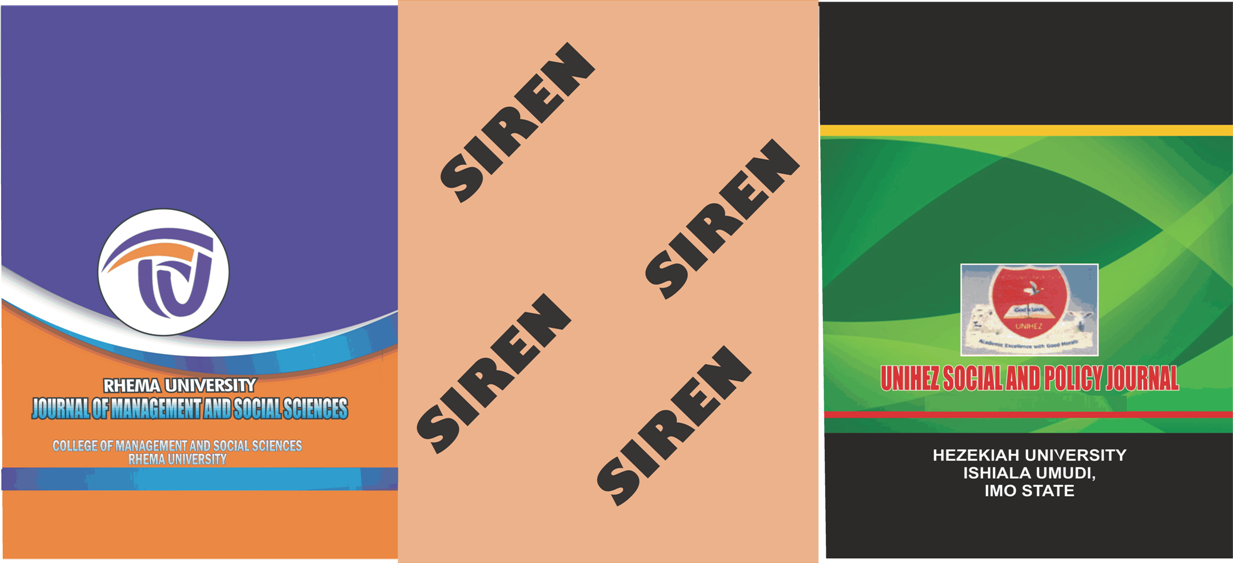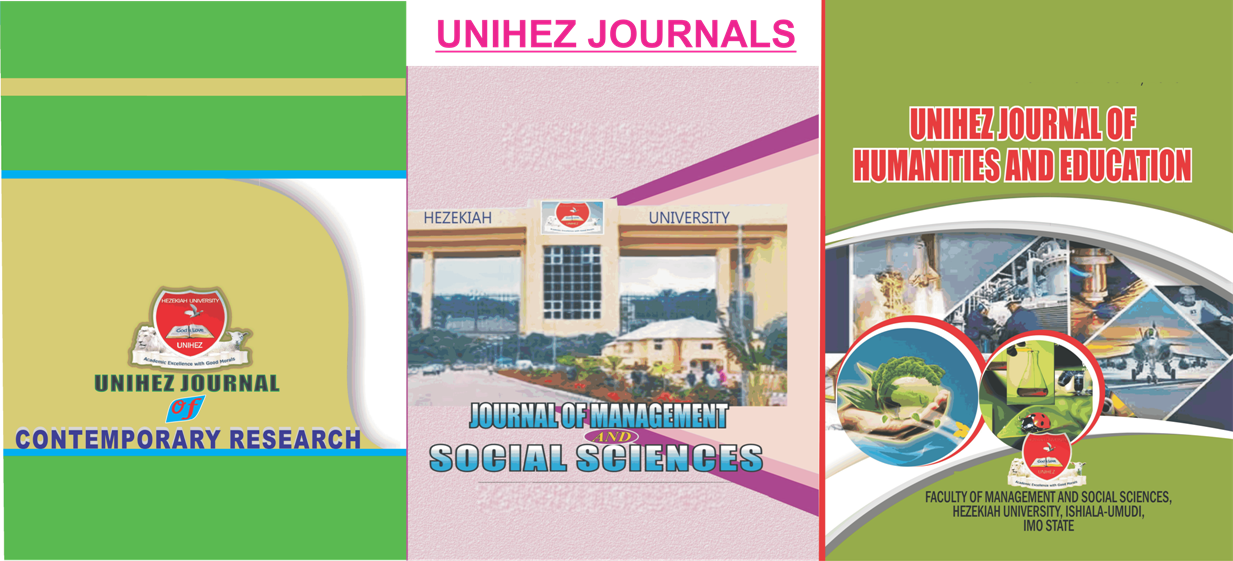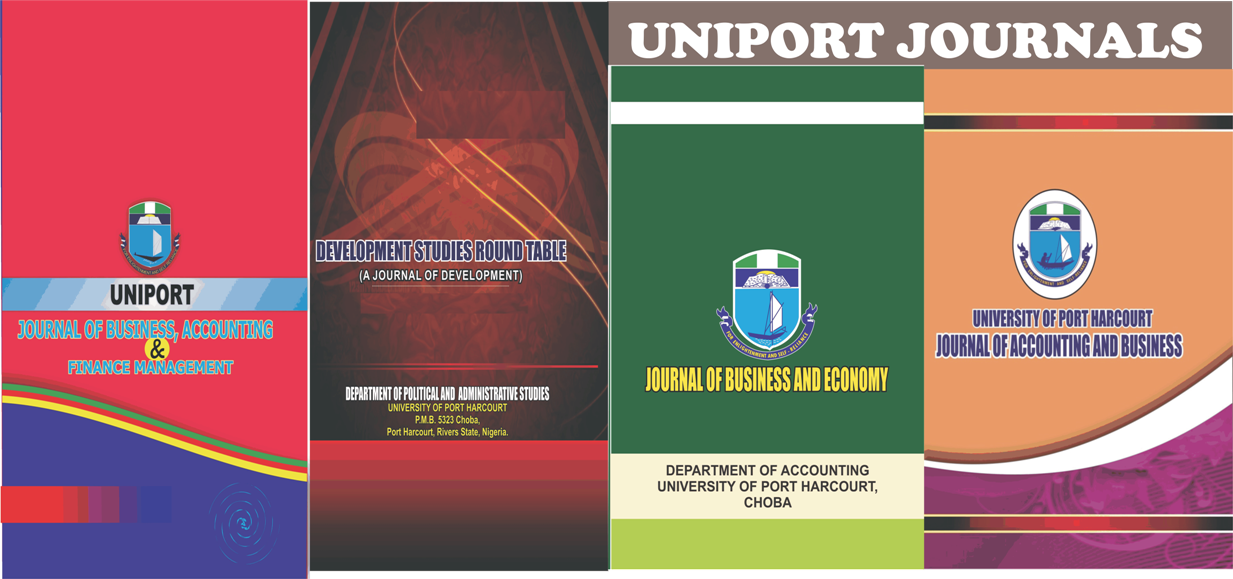2022 Archive
| 1 |
Title: EFFECT OF ENVIRONMENTAL FACTORS ON SMALL AND MEDIUM SCALE ENTERPRISES PERFORMANCE IN ABEOKUTA SOUTH, OGUN STATE, NIGERIA.pdf Author: Ajagbe, F. A. & Abiodun, J. A. Abstract: Abstract This study dealt with policy options for growth and development. It examined effect of environmental factors on small and medium scale enterprises performance in Abeokuta South, Ogun State, Nigeria.A well-structured questionnaire was designed to obtain relevant information from 240 respondents chosen through stratified sampling techniques and for the analysis, logit regression was employed. Using the regression model, the research analyzed the determinants of environmental factors on small and medium scale enterprises performance. It identified that environmental factors influenced by gender, age, education and marital status. The results revealed that businesses have no direct control or influence over their external environment, unlike their internal environment. Also, shows that management, capital, labour, competition, government regulation and environmental uncertainty affect SMEs performance in term of their profit generation. Based on this it was recommended that in order to achieve significant positive contribution of SMEs sector to economic development, government should create enabling environment for both existing and potential investors in the sector, this can be done through improvement of infrastructural facilities and formulation of policies favourable to SMEs. Keywords: Environmental factors, small and medium scale enterprises, performance, Nigeria View |
| 2 |
Title: ALTERNATIVE BANKING CHANNELS AND ECONOMIC GROWTH IN NIGERIA.pdf Author: Damola. A. Odewale & Emeka J. Okereke PhD. Abstract: Abstract With the introduction of electronic banking and cashless policy, it is speculated that asides reduction of robbery attack in the society, cashless policy has the potential to reduce risks and costs associated with cash mobilization, and therefore influence help the general performance of the economy in Nigeria. Hence, the need for this study become justified. This study examines the implication of alternative banking channels delivery and economic growth in Nigeria using quarterly data sourced from Central Bank of Nigeria Statistical Bulletin for the periods 2009 to 2020. The study employed multiple regression. Findings provided evidence supporting the fact that point of sale transaction has a significant relationship with gross domestic product growth rate in Nigeria. Meanwhile, Automated Teller Machine and internet banking exhibited a negative correlation with gross domestic product growth rate in Nigeria. The negative contribution of Automated Teller Machine and internet banking to gross domestic product growth rate in Nigeria could be attributed to high volume of fraudulent activities associated with this version of cashless policy and excessive charges on such transactions which could result to financial exclusion. Therefore, this study recommends that there is need for regular Public Enlightenment Awareness campaign about the cashless economy so that everyone will be well educated and familiarized with it. Such campaign is an opportunity to make people also understand the consequences of the cashless economy. Keywords; Banking channels, cashless policy, electronic banking. View |
| 3 |
Title: GOVERNMENT EMPLOYMENT INITIATIVES AND INTERVENTIONS IN URBAN ECONOMIC DEVELOPMENT IN NIGERIA (A CASE STUDY OF CONDITIONAL CASH TRANSFER SHEMES IN LAGOS, NIGERIA).pdf Author: Ojeaga P.I. PhD., Oyedele Ola .O PhD. & Adbulganiyu I.O Abstract: Abstract The study investigates the effect of government employment initiative and interventions on urban economic development in Nigeria using the metropolis of Lagos as a case study. This study delves on the central goverment employment initiatives on poverty diminution in Ikeja, Lagos State, Nigeria. The survey method was adopted. The quantitative research design was employed. A check out mass (sample size) of 120 respondents was identified from a people of 172 trivial and average businesses in the study areas and 96.7% reply proportion was recorded. Primary method of data collection was used as well as the use of structured questionnaire. The respondents answers were analyzed by Pearson product moment Correlation on SPSS (Statistical Package for Social Sciences) Version 20.0. The inspection demonstrates that cash transfer loan scheme does not have significant effect on employment generation (P=0.168 > 0.05; r = 0.129) and also equity grant has significant impact on job opportunities (P = 0.000 < 0.05; r = 0.736). Based on the consequences of findings, the study recommends that strict control must be added to provision of adequate cash loan with fantastically slump finance concern rate. Keywords: Government, Employment, Initiatives, Urban Economic Development and Lagos Metropolis View |
| 4 |
Title: IMPACT OF FINANCIAL LIBERALIZATON ON THE PERFORMANCE OF DEPOSITE MONEY BANKS IN NIGERIA.pdf Author: Joseph Eyom & Emeka J. Okereke PhD Abstract: Abstract It has been believed that financial liberalization can stimulate industrial growth, national output and strengthening of the banking system which may be translated into overall growth of the economy by efficient allocation of credit. The allocation generates investment opportunities by reducing the cost of investment, deregulations. This is long recognized in literatures to have become a stylized fact. This is because the market equates the supply and demand of national savings. Higher real interest rates increase financial intermediation, which in turn raises the rate of economic growth in developing countries. However, excessively high interest rates will have unfavorable economic effects. This can be avoided if nations practice financial liberalization of the banking system under appropriate conditions. In entering this argument, the current paper examines financial liberalization and performance of deposit money banks in Ghana, Kenya, Nigeria and South Africa. Using data from World Development Indicator we employ the Nigerian banks as sample representative from 2011 to 2019. The study used panel data framework to estimate the dataset. Findings indicate a positive relationship between interest rate and assets. There is also evidence of a positive relationship between liquidity ratio and assets of deposit money banks. The study concludes that financial liberalization has positive impact in the performance of deposit money banks in the region. Keywords: Financial Liberalization, Asset, Interest Rate, Liquidity View |
| 5 |
Title: CORPORATE GOVERNANCE AND ORGANIZATIONAL PERFORMANCE IN NIGERIA (A CASE OF THE MULTI NATIONAL IN FOOD AND BEVERAGE INDUSTRY IN NIGERIA).pdf Author: Ojeaga Paul I. PhD., Oyedele Ola Olusegun PhD. & Adbulganiyu Ibrahim Olakunle Abstract: Abstract This research work investigates the influence of Corporate Governance on the performance of the Food and Beverage Industry in Nigeria. The quantitative research design was employed. A test sample size of 119 respondents was identified from a inhabitants of 180 employees from Flower Gate Factory Lagos in the review areas and 99.1% responses was recorded. Primary data was used. Structured questionnaire was administered and the answers were analyzed via Pearson Product Moment Correlation on SPSS (Statistical Package for Social Sciences) version 20. The result show that accountability as a measure of corporate governance has significant impact on organizational growth (with P=0.000 < 0.05; r = 0.840); Board Composition as a measure of corporate governance has significant influences on Organization’s Competitive edge (P = 0.000 < 0.05; r = 0.676); and level of compliance as a measure of corporate governance has significant effect on Organizational profitability (P = 0.000 < 0.05; r = 0.854). Keywords: Corporate Governance, Organization, Performance, Accountability, Board Composition and Level of Compliance View |
| 6 |
Title: CORPORATE RESPONSIBILITY ACCOUNTING CULTURE AND RETURN ON EQUITY OF SELECTED LISTED COMPANIES IN NIGERIA.pdf Author: Aguguom, T. A., Tuoyo, C. A., Olanipekun, E. & Oladele, S.O. Abstract: Abstract Structuring activities into responsibility centers, autonomy, and optimization of resources is a priority in meeting investors’ performance and return on equity expectations. Studies have shown that meeting these expectations of adequate performance, evaluation models and acceptable reward systems have been complex and multifaceted. Inconsistencies and inclusiveness have prevailed in reported studies, in contributing and expanding the frontiers, this study investigated the effect of corporate responsibility accounting culture on return on equity (ROE) of selected listed companies in Nigeria. Ex-post facto research design was adopted. The population consisted of 173 quoted companies in Nigeria as of 31st December 2020. Twenty companies were purposively selected for a period of 10 years (2011-2020). Validity and reliability of the data were premised on the scrutiny of financial statements of the companies by the external auditors. Descriptive and inferential panel data regressions were used to analyze the data. The study revealed that the return on equity of listed companies in Nigeria was significantly affected by responsibility accounting, (AdjR2=0.0465; F-Sat. =5.611; p-value =0.000). Introduction of control variables revealed a stronger effect, corporate responsibility accounting with leverage and firm size exhibited a positive effect on ROE, (AdjR2=0.0993; F-Sat. = 4.982; P-value =0.000. It concluded that corporate responsibility accounting had a positive significant effect on the ROE of selected listed companies in Nigeria. The study recommended that management should ensure adequate and result-oriented delegation, activity-based costing, achievable project budgeting, and cross-functional teams, and an adequate performance evaluation model towards achieving corporate objective that would influence better ROE. Keywords: Activity centers, Decentralization, Evaluations, Return on equity, Responsibility Accounting, Return on Equity View |
| 7 |
Title: ISSUES IN HUMAN RESOURCE PRACTICE IN DEVELOPING COUNTRIES.pdf Author: JOHN MARK Abstract: Abstract While it may well be said that the human resource practice is witnessing a growing interest in advanced states, in developing countries organization and companies still deliberate on its relevance. The consequence of this is that too many times managers have no job space to absolve the young school leaver or graduate who may need the desk to practice his skill. This debate in regional difference to the practice of human resources retells to the fact that scholars in developing countries are yet to emerge as the relevance of the course is yet to appeal to many of the companies. The paper is a position one, and so avows that three basic factors are threats to the practice of human resources in developing states. These include: the issue of occupational relevance, the issue of cost and the issue of merger. The paper claims offers a solution thereby agitating that the state through the industrial court, must pass into law for companies with more than twenty staff to create a job space for the human resource practitioner. The paper extracted its data from content analysis of secondary sources. View |
| 8 |
Title: CORPORATE SOCIAL RESPONSIBILITY ACCOUNTING AND THE FINANCIAL PERFORMANCE OF OIL AND GAS COMPANIES IN NIGERIA.pdf Author: Christopher C. Ebere & A.B Cotterell Abstract: Abstract This research paper investigated the relationship between corporate social responsibility and financial performance of listed oil and gas companies in Nigeria for a period of ten (10) years from 2010 to 2019. Corporate social responsibility activities were measured in terms of expenditures on Employee Health and Safety Programs (EHSP); Environment Protection and Remediation Activities (EPRA); and Community Engagement and Charitable Donations (CECD). Financial performance was measured in terms Net Profit Margin (NPM) and Return on Capital Employed (ROCE). Data collected through the process of content analysis from annual financial statements and analysed using panel least square (PLS) estimation method. Results revealed that EHSP had a positive and significant relationship with NPM while CECD also had a positive and significant relationship with ROCE. On the other hand, CECD had a significantly negative relationship with the NPM; EHSP had a negative and significant relationship with ROCE. EPRA had a positive and non-significant relationship with NPM while EPRA also had a positive and non-significant relationship with ROCE. It was thus concluded that corporate social responsibility activities had mixed relationships with the financial performance of oil and gas companies in Nigeria. It is thus recommended that oil and gas companies revamp their corporate social responsibility expenditures methods and strategies in order to reap more benefits from such activities; It is further, recommended that government should provide incentives to encourage oil and gas companies to engage in more CSR activities; Finally, the society - including local communities and charitable organizations among others who benefit directly from the CSR largesse of these companies can find ways to communicate their appreciation for such act to the companies. View |
| 9 |
Title: FACTORS INFLUENCING OPEN EDUCATIONAL RESOURCES ON INSTITUTIONAL REPOSITORIES PERFORMANCE IN SELECTED UNIVERSITIES IN ABEOKUTA OGUN STATE, NIGERIA.pdf Author: Ajagbe, F. A., Njeze, M. E. & Adegbite, D. O Abstract: ABSTRACT The study examines factors influencing open educational resources on institutional repositories performance in selected universities in Abeokuta Ogun State, Nigeria. Both questionnaire and interviewed techniques were used for data collection from120 respondents chosen through stratified sampling techniques. In analyzing the data regression was employed in addition to conventional descriptive statistics such as tables, frequency distribution and percentages. The results showed thatfactors influencing open educational resources on institutional repositories performance is strongly influenced by gender, age, education, and marital status. Also,the statistics result from the model summary table revealed that the extent to which the variance, performance can be explained byfactors influencing open educational resources is 27.1% (R Square = 0.271). The ANOVA table shows the Fcal 48.579 at 0.000 significant levels. The table shows that factors influencing open educational resources have significant effect on institutional repositories performance.Based on the findings, it can therefore be concluded that awareness of OER among educators are relatively high, knowledge of OER repositories is on the lowest ebb. In view of the fact that Open Educational Resources (OER) are essential component resources which support educators, students and researchers in searching for educational resources in a structured way as well as sharing their own materials, it was therefore recommended thatmore awareness should be created for proper understanding of creative commons licencing levels used by OER repositories and awareness on how best to locate OER Keywords: Regression analysis, open educational resources, institutional repositories, performance, Nigeria. View |
| 10 |
Title: FINANCIAL INCLUSION, PERSONAL INCOME AND OUTPUT GROWTH IN NIGERIA.pdf Author: James John Otokwala & Emeka J. Okereke PhD Abstract: ABSTRACT This study investigates the nexus between financial inclusion, personal income and output growth in Nigeria covering the periods of 1981 to 2019. It adopts the unit root test, cointegration test and error correction model (ECM), using annual series data sourced from the Central Bank of Nigeria (CBN) Statistical Bulletin and World Bank World Development Indicator (WDI). The study proxy financial inclusion using ratio of credit to the private sector to gross domestic product, and economic growth using real gross domestic product. The Johansen result indicates long run relationship between real gross domestic product, ratio of credit to the private sector to GDP, personal income and money supply. The study found financial inclusion have a positive and significant effect on real gross domestic product. Personal income and money supply both stimulate economic growth significantly. The study recommends Nigerian banks to develop financial products to reach the financially excluded regions of the country and government should strengthen the regulatory framework so as to ensure effective and efficient credit delivery to the private sector. Keywords: Financial Inclusion, Economic Growth, Personal Income, Error Correction Model View |
| 11 |
Title: AGENCY COST AND BUSINESS FAILURES IN NIGERIA; A CASE STUDY OF OGUN STATE AUDIT PROFESSIONALS.pdf Author: Owolabi T. J PhD., Craig A.O & Awe S. O Abstract: Abstract Agency cost is a continuous phenomenon in todays business world, is considered an essential and significant part of business sustainability and survival. This study examined how the agency cost has contributed to the business failures and its sustainability. The business failure is measured using business collapse and sustainability of firms in Ogun State. For this study, agency cost and corporate governance are the proxies for agency cost.This study employed a survey research design. Population and sample size comprised the entire audit professionals in Ogun state. Data for the study were gathered from sixty-five audit professionals randomly selected. The data were analyzed using descriptive and Ordinary Least Square regression methods.The findings of the regression result indicate that agency cost proxies have a significant effect on business failure in Nigeria. For instance, corporate governance has significant positive effects on sustainability in Nigeria, while agency cost has a positive and significant effect on the level of business failures in Nigeria. In conclusion, agency costs are favourable and significant to drive business failure in Nigeria. The study recommended that for corporate sustainability to be guaranteed, best practices in corporate governance should be in place, and external auditors should not be too hasty in giving their opinion of the state of affairs of audited firms so as not to be liable for future collapse of the firms. Keywords: Sustainability, agency cost, business failure, corporate governance, business collapse. View |
| 12 |
Title: SERVICE QUALITY AND CUSTOMER PATRONAGE F PUBLIC HEALTH INSTITUTIONS IN YENAGOA, BAYELSA STATE.pdf Author: Simeon, Baratuaipere (PhD) & Hamilton-Ibama, Edith-Onajite Lolia (PhD) Abstract: This study examines the relationship between service quality and customer patronage of public health institutions in Yenagoa, Bayelsa State. This study employed the cross sectional survey research design. The population of the study is all hospital patients in public health institutions in Yenagoa. This population is infinite. Hence, the study randomly accessed 300 patients for the research. A total of 300 copies of the questionnaire were distributed to patients of public health institutions in Yenagoa metropolis, Bayelsa State, only 280 copies were returned representing 93% of the total number of questionnaire distributed. After coding and editing/data cleansing, only 250 copies of the questionnaire were valid to be used, representing 83% of the total number of questionnaire distributed to the respondents. The study employed the use of Pearson product moment correlation (PPMC) for testing the hypotheses. This was aided with the statistical package for social sciences (SPSS) version 22.0. The findings of the study revealed that service quality of health sector improves customer patronage behaviour. The study therefore concludes that service quality implemented by firms improves customer patronage. The study recommends that the public health sector management in Yenagoa should adopt service quality reliability and quality assurance. This will enhance customer satisfaction and retention and lead to positive customers’ patronage behaviour. Keywords: Service Quality, Customer Patronage, Reliability, Assurance, Customer Satisfaction, Customer Retention. View |
